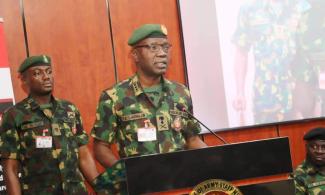
The army chief said that it is unrealistic to secure over 200 million Nigerians with two million security agents, out of whom, a little over 100,000 are active soldiers of the Nigerian Army without any reserved forces.
Nigeria’s Chief of Army Staff (COAS), Lieutenant General Taoreed Lagbaja, has lamented the extreme shortage of security personnel, inadequate funding and their effects on the security situation in the country.
The army chief said that it is unrealistic to secure over 200 million Nigerians with two million security agents, out of whom, a little over 100,000 are active soldiers of the Nigerian Army without any reserved forces.
Lagbaja said this while speaking at the 2024 Distinguished Personality Lecture titled "The Roles and Contributions of the Nigerian Army to National Development," jointly organised by the Centre for Peace and Strategic Studies, University of Ilorin, and the Martin Luther Agwai International Leadership and Peacekeeping Centre, Jaji.
The event was organised on Monday in Ilorin, the Kwara State capital, to mark the United Nations International Day of Peace.
The COAS who was represented by the Chief of Training (Army), Major General Sanni Gambo Mohammed, lamented that the manpower of security personnel in the country is largely inadequate to secure a country of Nigeria’s size, The Guardian reports.
Lagbaja stressed, “In a country with over 200 million people, it is unrealistic for security agencies totalling around two million, including an army of just over 100,000 active personnel without a reserve force, to secure the entire population.
"The significant gap in resources is being exploited by criminal elements. To address this issue, it is crucial to invest in expanding and strengthening security forces, ensuring they have adequate personnel and resources."
Also according to Lagbaja, inadequate funding affects the level of equipment held by the Armed Forces of Nigeria (AFN), hence, having a direct impact on performance of the military.
Describing national development and national security as costly, the COAS said, "The entire AFN had a budget of about $2.8 billion in 2023, with an additional supplementary (budget) of about one billion dollars. “However, not all the budgetary provisions were eventually released.”
He said, “Although funding for the AFN as a whole has been improving yearly since 2017, unfortunately, the downturn in the economic performance of the country has eroded the value of what is actually released.
"The inadequacy in funding is affecting the level of equipment holding of the AFN, which has a direct impact on performance."
Follow the Sahara Reporters channel on WhatsApp: https://whatsapp.com/channel/0029VaFClvtH5JM6SSsP7M2Y